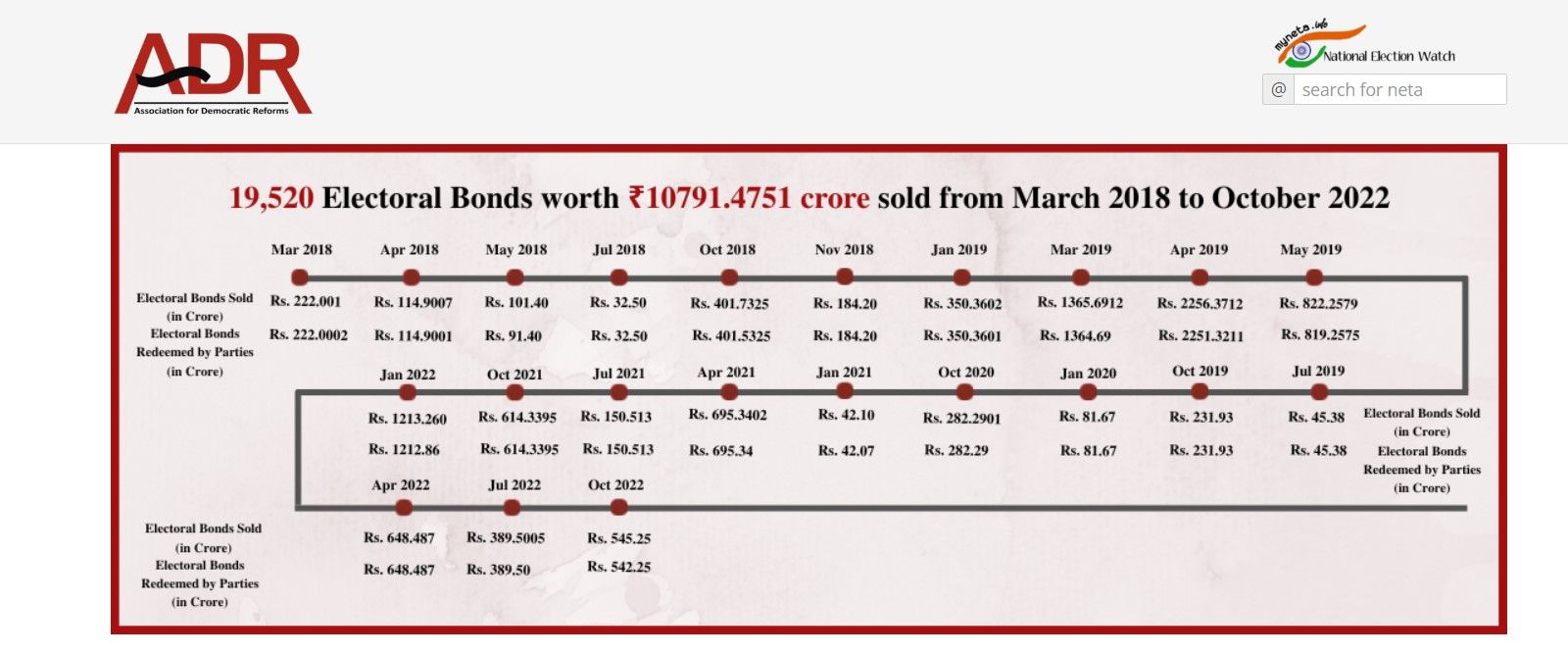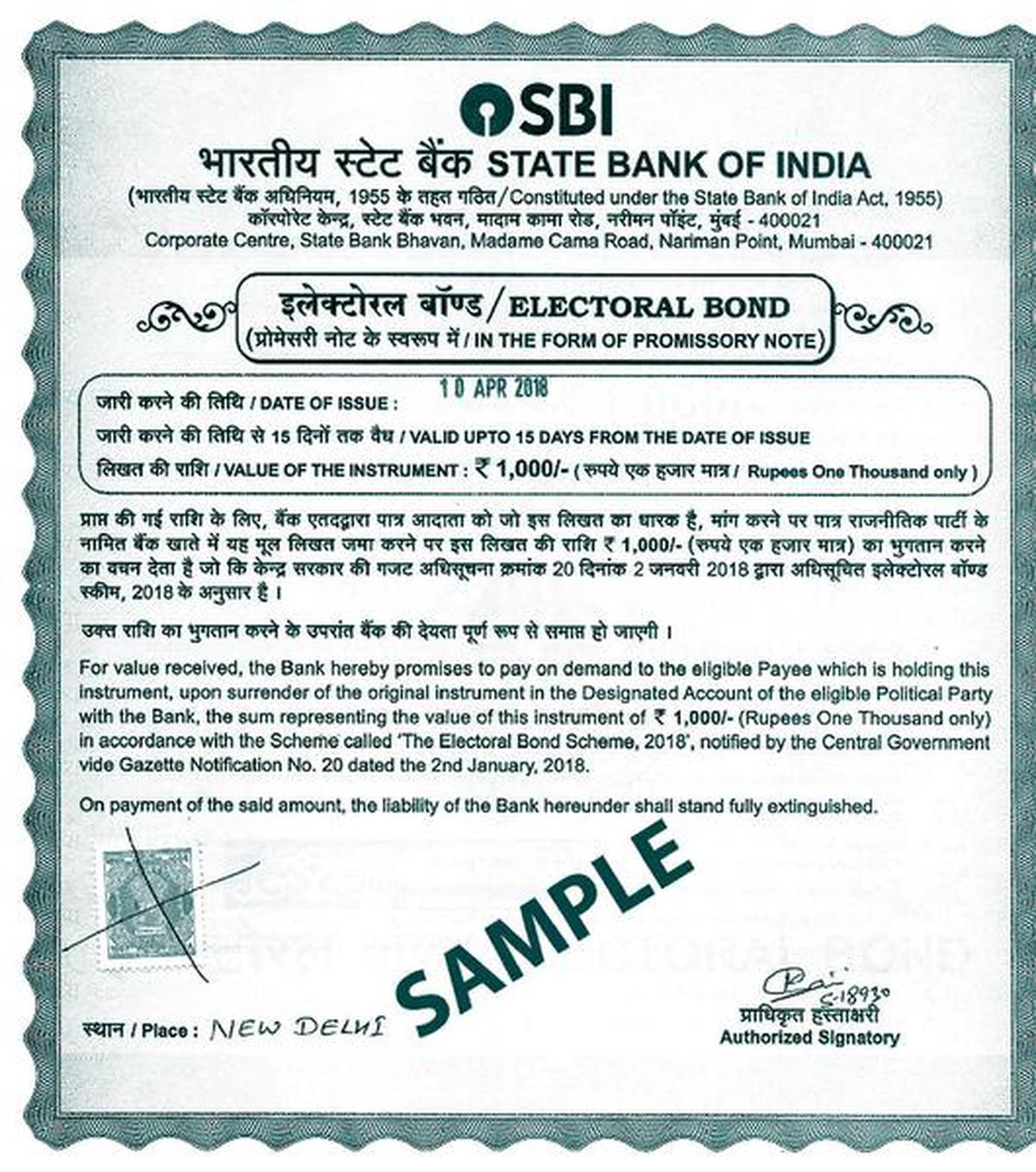How Electoral Bonds Benefit The Ruling Party
The Association for Democratic Reforms (ADR) has published data indicating that electoral bonds worth 114.5 Crore were purchased ahead of the Gujarat assembly elections.
The Union Ministry of Finance recently amended the scheme to extend the cut off date for the purchase of electoral bonds allegedly to enable purchase during the Gujarat and Himachal Pradesh election campaign.
The Association for Democratic Reforms (ADR) has written to the Election Commission pointing out that this amendment is a violation of the Model Code of Conduct.

Listen to the article in English (6.35 minutes)
audio upload
Here is the story and history of electoral bonds
The 2017-18 central budget introduced electoral bonds, a new way for political parties to accept donations.
It was envisaged this will increase transparency in political funding.
An electoral bond is similar to a demand draft.
The sole purpose of an electoral bond is to fund political parties.
An electoral bond will have the name of the political party receiving donation on it.
An electoral bond will not have the name of the donor on it.
Any Indian citizen can buy electoral bonds.
Any private, public, or one-person company based in India also can buy electoral bonds.
No foreign company can buy electoral bonds.
Indian subsidiaries of foreign companies can buy electoral bonds.
Any political party that scored more than 1% votes in the previous Lok Sabha or state assembly election can receive donation through electoral bonds.
All political parties must specify one State Bank of India (SBI) account to receive money through electoral bonds.
The parties should also notify the Election Commission about this SBI account.
The electoral bonds can be purchased in the ten day period in the beginning of each quarter- that is, 1-10 January, 1-10 April, 1-10 July, and 1-10 October.
Electoral bonds can be purchased at 29 authorised SBI branches across India.
Account holders with SBI as well as non-account holders can purchase EBs on supplying KYC details.
Electoral bonds are issued in multiples of Rs 1000/-, Rs 10000/-, Rs 1 lakh, and Rs 1 Crore.
EBs cannot be purchased using cash. Cheque or digital payment has to be the payment mode.
The KYC details of the buyers collected by the bank remain confidential.
The electoral bond is physically handed over to the political party.
Electoral bonds must be encashed within 15 days of receipt.
The political parties can redeem the bonds only in authorised SBI accounts that are notified to Election Commission.
348 electoral bonds are valued at Rs 1 Crore.
Since its launch in March 2018 till November 2022, bonds worth above Rs 10,246 Crore were sold.

It is interesting to note that 93.5% of these bonds sold were in the denomination of Rs 1 Crore.
Electoral bonds are traceable as compared to cash donations from unknown sources.
There is a possibility that unknown cash donations could be from black money sources.
The anonymity of the donor is ensured so that rival political parties do not put pressure on that person.
The anonymity of the donor also helps that person to be disassociated with a particular party publicly.
The negative aspect of an electoral bond is that the party receiving it, the bank issuing it, the Reserve Bank of India, and the ruling party can know the identity of the donor.
Not surprisingly, ruling parties have an advantage because of this factor.
The largest beneficiary of electoral bonds since their inception is the BJP, the ruling party at the Centre since 2014.
Of the total Rs 6,201 Crore worth of electoral bonds purchased between 2017-18 and 2019-20, 67.9 percent worth of Rs 4,215.89 crore has gone to the BJP .
Another negative impact of electoral bonds is that the wealthy corporates and individuals can anonymously buy electoral bonds for a political party and then lobby with that party for personal or business gains.
Organisations such as Association for Democratic Reforms have observed that electoral bonds have actually decreased transparency in political funding.
In 2018, an online community platform, LocalCircles, conducted a survey which showed that 71% of Indian citizens think that anonymity of donor should not be there in the purchase of electoral bonds.
In 2017, Association for Democratic Reforms published a report that revealed that between 2004 and 2014, the political parties received 70% of donations from unknown and undisclosed sources.
A Supreme Court Bench of Justices B R Gavai and B V Nagarathna is looking into the petitions filed by Association for Democratic Reforms, Communist Party of India (Marxist) and others challenging the system of electoral bonds.
The Election Commission of India also had filed a counter-affidavit in the Supreme Court saying that the anonymous nature of the Electoral Bonds Scheme will negatively impact the transparency of political funding and demanding it to be withdrawn.







